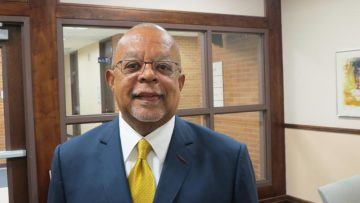Gwendolyn Glenn in WFAE Radio:
 Henry Louis Gates, a renowned and award-winning filmmaker, author of two dozen books, a professor and director of African American studies at Harvard University, has written about race in America. He explores the Civil War, Reconstruction to Jim Crow, the civil rights movement and the state of race relations today. Gates spoke at UNC Charlotte Tuesday for the school’s 2019 Chancellor Speaker Series and at the uptown campus to school donors and city leaders. WFAE’s “All Things Considered” host, Gwendolyn Glenn, caught up with him to talk about race, voting, economics and other issues.
Henry Louis Gates, a renowned and award-winning filmmaker, author of two dozen books, a professor and director of African American studies at Harvard University, has written about race in America. He explores the Civil War, Reconstruction to Jim Crow, the civil rights movement and the state of race relations today. Gates spoke at UNC Charlotte Tuesday for the school’s 2019 Chancellor Speaker Series and at the uptown campus to school donors and city leaders. WFAE’s “All Things Considered” host, Gwendolyn Glenn, caught up with him to talk about race, voting, economics and other issues.
Gwendolyn Glenn: Let’s talk about the message that you want to leave people with. You’ll be talking with students, faculty from UNC Charlotte and also a lot of city leaders here in Charlotte. What’s the message you want to leave today?
Henry Louis Gates: It’s very important for people to understand the history of Reconstruction, the period following the Civil War and its rollback because it is a precursor to the period that we’re experiencing today. Between 1870 and 1877, 2,000 black men were elected to public office, including Chris Rock’s great-great-grandfather, who was elected to the House of Delegates in South Carolina. But within a few years, poof — all that disappeared.
Glenn: And I was going to ask you about that because you talk about that in your book and I think in an interview I heard you compare that roll back after Reconstruction to Jim Crow and on to what’s happening now with the Trump administration and that rollback.
Gates: Reconstruction was 12 years of unprecedented black freedom followed by an alt-right rollback. And we’re living through a period of eight years of a beautiful, brilliant, black family in the White House. A brilliant black president followed by an alt-right rollback. So the lesson of Reconstruction is that rights that we think are permanent, the right to vote, birthright citizenship, and the right of a woman to determine the fate of her own body. We think that these are inviolable. But they’re not they’re subject to the interpretation of the courts and sometimes the executive orders and that is the crisis that we’re facing today. So what happened in Reconstruction can happen again. The most important way, the most devastating way that Reconstruction was rolled back was through voter suppression.
More here. (Note: Throughout February, at least one post will honor The Black History Month. This year’s theme is “African Americans and the Vote.” Readers are encouraged to send in their suggestions)
